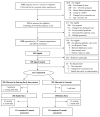Randomized Controlled Trial of a Primary Care-Based Child Obesity Prevention Intervention on Infant Feeding Practices
- PMID: 27113376
- PMCID: PMC4925185
- DOI: 10.1016/j.jpeds.2016.03.060
Randomized Controlled Trial of a Primary Care-Based Child Obesity Prevention Intervention on Infant Feeding Practices
Abstract
Objective: To determine the effects of a child obesity prevention intervention, beginning in pregnancy, on infant feeding practices in low-income Hispanic families.
Study design: The Starting Early randomized controlled trial enrolled pregnant women at a third trimester visit. Women (n = 533) were randomly allocated to a standard care control group or an intervention group participating in prenatal and postpartum individual nutrition/breastfeeding counseling and subsequent nutrition and parenting support groups coordinated with well-child visits. Outcome measures included infant feeding practices and maternal infant feeding knowledge at infant age 3 months, using questions adapted from the Infant Feeding Practices Study II and an infant 24-hour diet recall.
Results: A total of 456 families completed 3-month assessments. The intervention group had higher prevalence of exclusive breastfeeding on the 24-hour diet recall (42.7% vs 33.0%, P = .04) compared with controls. The intervention group reported a higher percentage of breastfeeding vs formula feeding per day (mean [SD] 67.7 [39.3] vs 59.7 [39.7], P = .03) and was less likely to introduce complementary foods and liquids compared with controls (6.3% vs 16.7%, P = .001). The intervention group had higher maternal infant feeding knowledge scores (Cohen d, 0.29, 95% CI .10-.48). The effect of Starting Early on breastfeeding was mediated by maternal infant feeding knowledge (Sobel test 2.86, P = .004).
Conclusions: Starting Early led to increased exclusive breastfeeding and reduced complementary foods and liquids in 3-month-old infants. Findings document a feasible and effective infrastructure for promoting breastfeeding in families at high risk for obesity in the context of a comprehensive obesity prevention intervention.
Trial registration: ClinicalTrials.gov: NCT01541761.
Keywords: Hispanic; feeding knowledge; pregnancy.
Copyright © 2016 Elsevier Inc. All rights reserved.
Conflict of interest statement
The authors declare no conflicts of interest.
Figures
Comment in
-
Prenatal Material Hardship and the Internal Locus of Control Over the Prevention of Child Obesity: Progress Report.Acad Pediatr. 2018 Aug;18(6):603-604. doi: 10.1016/j.acap.2018.01.016. Epub 2018 Feb 5. Acad Pediatr. 2018. PMID: 29421167 Free PMC article. No abstract available.
References
-
- Arenz S, Ruckerl R, Koletzko B, von Kries R. Breast-feeding and childhood obesity--a systematic review. Int J Obes Relat Metab Disord. 2004;28:1247–1256. - PubMed
-
- Grummer-Strawn LM, Mei Z Centers for Disease Control and Prevention Pediatric Nutrition Surveillance System. Does breastfeeding protect against pediatric overweight? Analysis of longitudinal data from the centers for disease control and prevention pediatric nutrition surveillance system. Pediatrics. 2004;113:e81–6. - PubMed
Publication types
MeSH terms
Associated data
Grants and funding
LinkOut - more resources
Full Text Sources
Other Literature Sources
Medical



